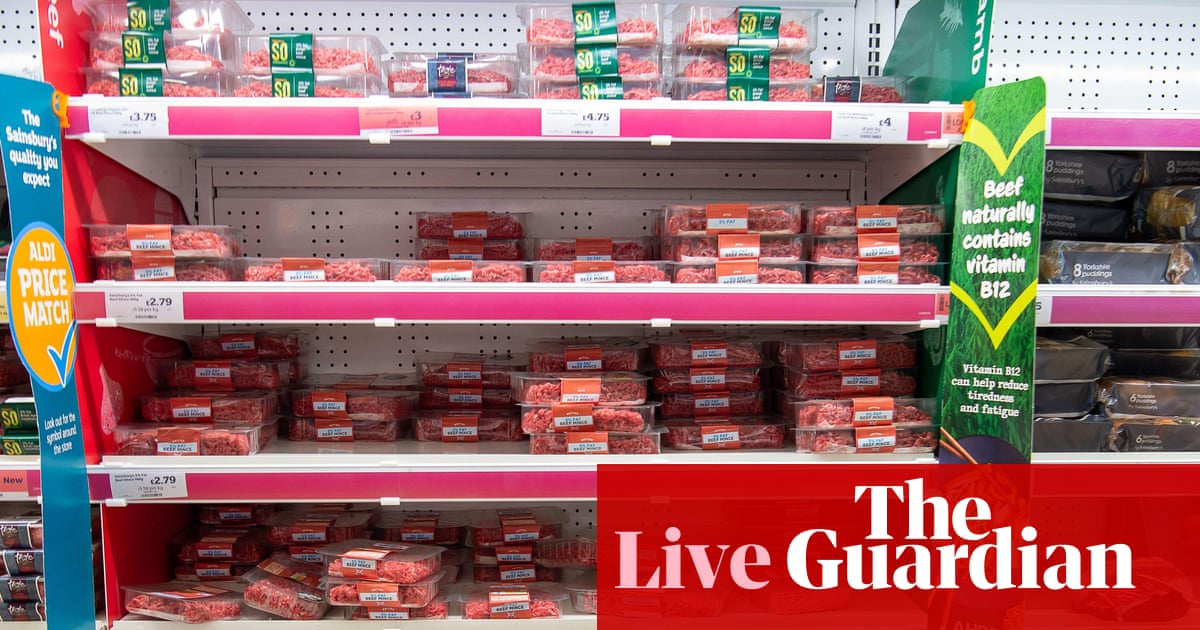UK inflation accelerates to 3.8% on higher air fares and other transport costs
UK inflation has accelerated more than expected to an annual rate of 3.8% in July, driven by higher transport costs, such as air fares.
It’s the second month in a row that inflation has surprised on the upside.
It compares with an annual increase in the consumer prices index of 3.6% in June, according to the Office for National Statistics.
The core rate, which strips out food and energy, rose to 3.8% from 3.7%, also higher than expected.
Updated at 02.24 EDT
Key events
Show key events only
Please turn on JavaScript to use this feature
Rail fares in England on track to rise by as much as 5.8% next year
Rail fares in England are on track to rise by as much as 5.8% next year, sparking concern among passenger groups.
Increases in rail ticket prices are usually calculated by adding one percentage point to July’s inflation reading on the retail prices index (RPI), which was 4.8%. The government has not confirmed how it will determine the cap on regulated fare rises in 2026, but this year’s 4.6% hike was one percentage point above RPI in July 2024.
Regulated fares, which account for about half of rail journeys, would rise by 5.8% in 2026 if the increase follows the same pattern as last year.
Updated at 02.19 EDT
Air fares jump due to timing of school holidays; petrol and diesel prices also rise
Air fares rose by 30.2% between June and July, compared with a monthly rise of 13.3% a year earlier.
The increase is the biggest July increase since the collection of air fares changed from quarterly to monthly in 2001, and was probably influenced by the timing of school summer holidays.
Petrol and diesel prices also rose, with the average price of petrol up by 2p a litre between June and July while diesel rose by 2.9p a litre, compared with price declines in the same period last year.
Updated at 02.24 EDT
UK inflation accelerates to 3.8% on higher air fares and other transport costs
UK inflation has accelerated more than expected to an annual rate of 3.8% in July, driven by higher transport costs, such as air fares.
It’s the second month in a row that inflation has surprised on the upside.
It compares with an annual increase in the consumer prices index of 3.6% in June, according to the Office for National Statistics.
The core rate, which strips out food and energy, rose to 3.8% from 3.7%, also higher than expected.
Updated at 02.24 EDT
Introduction: UK inflation data expected to show further rise on higher food and energy prices
Good morning, and welcome to our rolling coverage of business, the financial markets and the world economy.
It’s UK inflation day.
Inflation is expected to have edged higher to an annual rate of 3.7% in July, underlining the challenge faced by the chancellor, Rachel Reeves.
In June, the annual change in the consumer prices index unexpectedly accelerated to 3.6%, driven by fuel and food prices. The figures are due to be released at 7am by the Office for National Statistics.
Core inflation, which excludes energy and food (which tend to be volatile), is expected to have stayed at 3.7%.
Investec economist Sandra Horsfield has looked at the broader picture.
The direction of travel in UK inflation has not been welcome as of late: having dipped below the 2% target in September 2024, the trend since has pointed firmly upwards, with overall CPI inflation touching 3.6% year-on-year in June. The picture is less stark on the ‘core’ CPI measure (excluding food, energy, alcohol and tobacco) but still not helpful: on that basis, inflation rose from 3.2% to 3.7% between the same two months.
The broad story underlying this is that food prices have accelerated and what was a significant year-on-year fall in energy prices has largely ended. And whereas services inflation has eased, its fall has been relatively modest and not sufficient to offset the re-acceleration in non-industrial goods prices (labelled ‘core’ goods by the BoE). It is no wonder then that the Bank of England has become less sure that prospects for disinflation are firm enough to allow for further rate cuts at the same pace as over the past year.
Turning to the July figures, she expects little by way of reassurance for the monetary policy committee. While the Oasis tour may have pushed up hotel prices in July and August, similar to the Taylor Swift tour in June 2024, this should unwind in September. UK ticket sales over the tour were similar, at 1.38m versus 1.2m.
On the food price rise, indications are that price pressures built further for certain items such as beef that have added substantially to the pace of overall food price inflation rises. Energy price inflation too looks to have risen, swinging from negative to positive year-onyear rates, largely on petrol price changes.
On the core side, though, we see a more benign underlying trend than the numbers are likely to show… We think clothing prices in spring/summer ranges could have seen less discounting than usual in July the unusually hot weather this year. Again, this should unwind once the sales period is over.
By contrast, the eurozone’s inflation rate for July is likely to be confirmed at 2% later today.
On Wall Street, US tech stocks sold off yesterday amid warnings over the future of the artificial intelligence boom. A report from the Massachusetts Institute of Technology said “95% organisations are getting zero return” from their investments in generative AI.
The tech-heavy Nasdaq finished the day 1.46% lower, its biggest one-day decline since the start of August. The chipmaker Nvidia fell by 3.5% while the software group Palantir slumped by 9.4% and chip designer Arm lost 5%.
Asian markets followed in Wall Street’s footsteps, with Japan’s Nikkei down by 1.55% and Taiwan losing nearly 3%.
The Agenda

